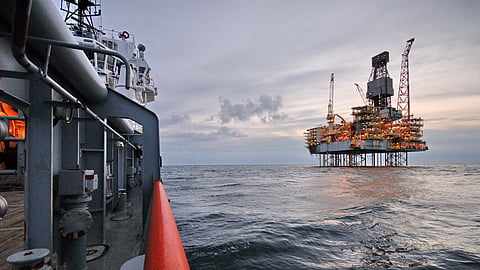Chevron enters bidding war for select Lukoil foreign assets
US oil major Chevron is studying options to buy global assets of sanctioned Russian oil firm Lukoil, five sources familiar with the process told Reuters on Monday.
The US Treasury gave clearance last week to potential buyers to talk to Lukoil about foreign assets. Chevron would join Carlyle and other firms in the race for the Lukoil portfolio worth at least $20 billion.
The United States last month imposed sanctions on Russia’s two biggest oil companies, Lukoil and Rosneft, as part of efforts by President Donald Trump's administration to force Moscow into peace talks with Ukraine.
Chevron is exploring options to buy assets of Lukoil where the companies overlap rather than the entire portfolio, the five sources said. They asked not to be named as they are not allowed to speak to media. Chevron’s interest has not been previously reported.
Chevron said that it complies with laws and regulations applicable to its business and does not comment on commercial matters.
Lukoil extracts about two per cent of global oil output at home and abroad, and has said it is seeking buyers for its international assets, which produce 0.5 per cent of global oil and are estimated to be worth about $22 billion, based on 2024 filings.
US private equity giant Carlyle is exploring options to buy Lukoil’s foreign assets, sources told Reuters last week.
Lukoil has three refineries in Europe, stakes in oilfields in Kazakhstan, Uzbekistan, Iraq, Mexico, Ghana, Egypt and Nigeria, and hundreds of retail fuel stations around the world, including in the United States.
Lukoil has 13.5 per cent in the Karachaganak field and five per cent in the Tengiz field in Kazakhstan, which also have Chevron, Exxon Mobil, Eni and Shell among their shareholders.
The fields are the main source of crude for the CPC pipeline carrying more than 1.6 million barrels per day of crude, or 1.5 per cent of global oil demand, to global markets via Russia.
Lukoil also has a stake in the Nigerian offshore license OML-140, which Chevron operates.
Lukoil also operates the West Qurna 2 project in Iraq, where Exxon had long been the operator of the neighbouring West Qurna 1 project before exiting last year.
(Additional reporting by Jarrett Renshaw, Sheila Dang, Shadia Nasralla; Writing by Dmitry Zhdannikov; Editing by Jan Harvey and Nia Williams)


